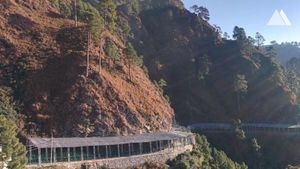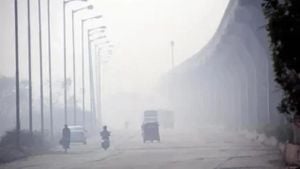Antarctica, long viewed as Earth's frigid frontier, is undergoing unexpected changes as new research highlights the dramatic greening of this icy continent. The data shows an acceleration of vegetation growth, significantly reshaping perceptions of one of the planet's most isolated regions.
According to scientists, including researchers from the University of Exeter, the greening is evident across the Antarctic Peninsula, where vegetation cover has increased more than tenfold from less than one square kilometer to nearly twelve square kilometers between 1986 and 2021. This transformation is particularly pronounced when one compares the time frame of the last three decades to the recent years, where the trend has ramped up by over 30 percent.
The study, published in the journal Nature Geoscience, utilized satellite imaging to analyze the rate of greening across the continent, shedding light on how climate change is altering even the harshest conditions on the planet. Directly correlational, the spikes of vegetation growth coincide with drastic reductions in sea ice extent—a feature historically defining the Antarctic environment. During the span of 2016 to 2021, these changes have become markedly more pronounced.
“The plants we find on the Antarctic Peninsula — mostly mosses — grow in perhaps the harshest conditions on Earth,” remarked corresponding author Thomas Roland. He emphasized how the previously extreme cold, which has dominated the region, is yielding to the effects of warming, enabling plant ecosystems to flourish where previously only snow and ice prevailed.
Interestingly, this greening is not merely about aesthetics; it's indicative of significant ecological shifts. The increased plant life will contribute organic matter to the soil—an important factor since much of Antarctica's soil is either barren or entirely absent. Researchers speculate this might pave the way for more diverse plant communities as conditions continue to evolve.
Oliver Bartlett, another researcher from the University of Hertfordshire, pointed out the shift has serious ramifications. The factors driving this greening phenomenon are visible signs of climate change, with Antarctica warming at rates faster than the global average. The continent has experienced more frequent extreme heat events, signals of changing climatic norms.
Yet, the immediate concern revolves around what these changes may mean for Antarctica's future. Bartlett remarked, “The sensitivity of the Antarctic Peninsula's vegetation to climate change is now clear, and under future human-caused warming, we could see fundamental changes to the biology and landscapes of this iconic and vulnerable region.” The researchers are adamant about the need for more studies to fully grasp the underlying processes behind this ‘greening’ and how it affects the broader ecological balance.
The growing presence of vegetation on the Antarctic Peninsula raises many questions about the ecological dynamics of the region. Analysts worry about the cascading effects these ice-to-vegetation shifts will have on local wildlife and global ecosystems. With mosses and other plants establishing themselves, it also poses potential shifts in habitat for various species, including microbes and insects typically found only in milder climates. Such changes could lead to the emergence of new ecological niches, previously uncharacteristic of the region.
Interestingly, mosses and other such hardy plants might be adapting to the changing climate faster than anticipated. Given their resilience and ability to withstand harsh conditions, they may become pivotal to the new ecological narrative of Antarctica. Roland noted, “We have to understand these changes and identify precisely what is causing them” to aid future conservation efforts.
Consequently, it’s not just about observing Antarctic flora; it invokes broader environmental stewardship discussions as humankind grapples with the reality of climate change. The notion of Antarctica greening can symbolize both hope and alarm, acting as both a reflection of resilience and the fragility inherent within ecosystems facing swift environmental shifts.
With growing international attention on climate change's broader impacts, the Antarctic situation continues to demand scrutiny. Understanding how global warming feeds back to influence such remote ecosystems could be key to managing and mitigating larger climatic shifts. Its ice shelves dictate ocean currents and global weather patterns; the alterations here could resonate far beyond its icy shores.
Understanding these developments carries weighty responsibilities for scientists and policymakers alike. They must not only document these significant changes but also develop strategies for managing ecosystems adapting to what some may call the new normal. Each scientific finding, like this research on greening, encourages us to rethink our relationship with the planet and the environments we often take for granted.
While Antarctica's transformation reflects alarming climate developments, it invites collaborative efforts across nations to address and mitigate the causes of climate change. The fate of one of Earth’s last untouched frontiers might very well hinge on actions taken today and how effectively the globe unites to combat rising temperatures and their associated impacts.
Although the data arises from one of the coldest places on Earth, the questions raised ripple through ecological and social concerns spanning every continent. How will societies adapt when such remote regions become harbingers of change? With Antarctica turning green, it signifies more than just shifting landscapes; it emphasizes the fragility of our planet and the urgent call to action for preserving the ecosystems we depend upon.



